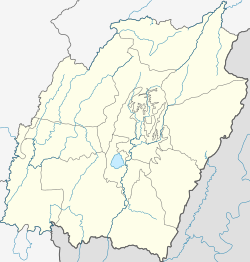Khangabok
| Khangabok | |
|---|---|
| Village | |
| Location in Manipur, India | |
| Coordinates: 24°36′31″N 94°00′10″E / 24.6084817°N 94.0028737°ECoordinates: 24°36′31″N 94°00′10″E / 24.6084817°N 94.0028737°E | |
| Country |
|
| State | Manipur |
| Area | |
| • Total | 20.47 km2 (7.90 sq mi) |
| Elevation | 781 m (2,562 ft) |
| Population (2011) | |
| • Total | 16,344 |
| • Density | 800/km2 (2,100/sq mi) |
| Demonym(s) | Khangabok Macha |
| Languages | |
| • Official | Meitei (Manipuri) |
| Time zone | IST (UTC+5:30) |
| PIN | 795138 |
| Telephone code | 91-3848 |
| Vehicle registration | MN04 |
| Sex ratio | 100:101 ♂/♀ |
| Website | manipur |
Khangabok is a village located about 25 km south of Imphal, in the state of Manipur, India. Its jurisdiction falls under the Thoubal District Division. Khangabok is one of the largest villages in Manipur in terms of area and population.
The Meiteis are the primary ethnic group populating the village. The language spoken is Meitei (also known as Manipuri), which was included in Eighth Schedule of Indian Constitution in 1992.
The name Khangabok is believed to have derived from the tree Khangra which covered the present-day village area. As people started settling in the area, the trees were cut down, and the place got the name Khangrapokpi meaning where Khangra is grown. The modern derivation of Khangrapokpi is Khangabok.
The Department of Archaeology, Government of Manipur, carried out excavation at Khangabok with an objective of ascertaining the cultural sequence and study of the ethno-archaeological aspects of the site in the campus of Khangabok Maisnam Leikai Boys' Primary School. Many goods comprising beads, bronze rings and plates, bones, potsherds were recovered from burial graves. The excavation revealed only the secondary pot burials with fragments of skull and bone with one to three pots from each burial. In addition, pot of medium size covered with ring-footed bowls were also unearthed. At least four to six thin bronze plates were found with each burial, perhaps used in ceremonial offerings. Two square metal coins were also found which belonged to the reign of Maharaj Garibniwaz(1709–48 AD).
Khangabok village is home to around 3520 families. As of 2011 India census, the total population of Khangabok is 16344. 49.83% of the population (8144) is male. The population of children(0-6 years) is 2184 which makes up 13.36% of total population of the village. Average Sex Ratio of Khangabok village is 1007 which is higher than Manipur state average of 985. Child Sex Ratio of the village 919, lower than state average of 930.
The literacy rate of Khangabok village is 72.00% (compared to 76.94% of Manipur). The Male literacy stands at 82.50% while female literacy rate is 61.71%.
Most of the people practice dual religion, namely Sanamahism and Hinduism. Lainingthou Ikop Ningthou is the Umanglai (village deity) of Khangabok for which the Lai Haraoba (pleasing of the village deity) is performed annually with traditional fervour in the month of Kalen (equivalent to May in English calendar).
Total area of Khangabok is 20.47 square kilometer, making it as the largest village in Thoubal District. Khangabok lies between 24-55 North latitudes and 94-98 East longitudes. Khangabok, because of its large area, is divided into three zones:
...
Wikipedia


